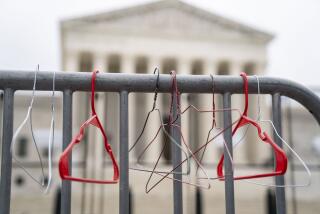Justice Requires a Career Judiciary : Demonstrated Ability, Not Political Agenda, Should Be Guide
- Share via
A judge has been defined as “a lawyer who knew a governor.” This sardonic observation, while often factually incorrect, mirrors the fact that members of the American judiciary, from justices of the peace to judges of our highest courts, are frequently not selected by the appointive powers on the basis of demonstrated ability, but rather to meet political or social agendas. Thus when Republicans are in power, prospective judicial appointees must meet one litmus test, whereas when the Democrats exercise the appointive authority, candidates deemed acceptable are expected to embrace totally different approaches to a given legal problem. And when contested state court judicial elections occur, the ultimate winner is frequently the candidate who hires an astute political manager and spends the most money, rather than the one objectively most qualified for the position.
It has always struck me as anomalous that we closely evaluate training and experience before we permit a physician to perform delicate surgery upon a patient; yet when it comes to selecting a judicial officer whose rulings in a case may gravely affect someone’s livelihood or freedom, our choice may have mediocre qualifications to even practice law, much less serve as a judge, and even that practical experience may have been of short duration. Equally startling is the fact that persons selected to serve as judges of our intermediate and highest appellate courts may never have practiced law or presided over a trial, and yet they are deemed appropriate final arbiters in our American system of justice.
Attempts have been made in various jurisdictions to utilize a merit system in the selection of judges, with minimal degrees of success. I believe that there is only one way to avoid confrontations over judicial selections such as that tendered by the Bork nomination or 1986’s bitter retention elections involving members of the California Supreme Court.
We must embark upon the development of a career judiciary, whose members would be selected without reference to race, sex, creed, color or political affiliation, but rather on the basis of demonstrated intellect and legal ability, and, just as importantly, emotional stability and objectivity.
We should pay our judges well in order to attract “the cream of the crop” and provide for elevation in higher courts as they demonstrate their entitlement to that recognition. To the charge that we would emerge with an elitist judiciary, I would plead guilty if by “elitist” one means that we would have selected and retained the best possible judges without reference to racial, political or ideological concerns. In this way, we would create a national judiciary representing a genuine cross section of our finest judicial talent drawn from all races and creeds.
Our American career judiciary would be forged in the following manner:
Upon graduation from law school, judicial candidates would be subjected to written and oral examinations administrated by local boards composed of judges, law professors and practicing lawyers, as well as community representatives, including people skilled in psycho-social evaluation. Promising survivors of this intensive selection process would be appointed to serve initially in courts of limited jurisdiction. Their progress would be closely monitored, and as they demonstrate acquired judicial skills (a good judge is not born overnight), they would be promoted in the judicial hierarchy, with greater responsibilities and commensurate increased compensation.
By thus committing themselves to a lifetime career on the bench, with its attendant honor and recognition, in one generation our career judiciary could accomplish what 200 years have not: a bench free of political pressures and, even more important, one free of the sources of popular discontent with the American judiciary chronicled by Dean Roscoe Pound back in 1906, and still largely unsolved more than 80 years later.
This approach, if adopted, would require both constitutional changes and an entirely different outlook by the American people on what they desire and expect from their judicial system.
Does this represent an indictment of the entire American judiciary? Of course not. The vast majority of judges are able and hard-working. But unless we are prepared to professionalize our national judiciary, we will continue to see divisive battles over confirmation, resignation of some of our most able jurists, and occasional appointment or election of marginally qualified judicial candidates. Only by the creation of a true career judiciary can we hope to achieve our professed dream of equal justice for all.
More to Read
Get the L.A. Times Politics newsletter
Deeply reported insights into legislation, politics and policy from Sacramento, Washington and beyond. In your inbox twice per week.
You may occasionally receive promotional content from the Los Angeles Times.










